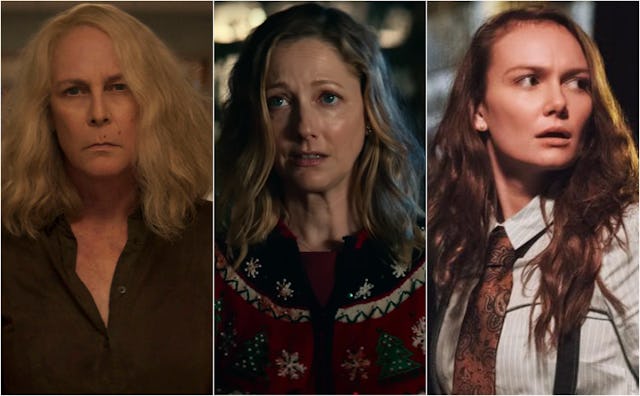5 Years Ago, Halloween *Almost* Gave Us The Feminist Horror Trilogy We Deserve
It missed a real multi-generational final-girl legacy moment.

During the closing scene of the most recent Halloween reboot, five years ago this month, it finally hit me — this is a feminist franchise. Ultimate final girl Laurie Strode (Jamie Lee Curtis), her daughter Karen (the inimitable Judy Greer), and Allyson (Andi Matichak), Karen's daughter and Laurie's granddaughter, sit in the back of a pickup truck after another All Hallow's Eve spent warding off ski-mask clad Michael Myers. The torch — or knife, as it were — has been passed to Allyson, an updated final girl for a new era, clutching Myer's blade.
Here were three women of different ages, carrying generations worth of inherited trauma, and they were the faces of what was supposed to be the feminist horror trilogy. The only problem? It ultimately wasn't.
The Her-story of Horror
I'll get to what I mean by that, but first, a brief history lesson: Horror has always been feminist. The trope of women usually being the last ones standing in the genre led to film historian Carol J. Clover coining the term "final girl" in her 1992 book Men, Women & Chainsaws: Gender in the Modern Horror Film. It refers to the last woman standing, usually a white teenage virgin, though films such as Scream (1996) would subvert that.
Though horror has often reveled in the dehumanization of marginalized groups such as women, people of color, and the queer community, the reclamation of the final girl and horror in general by such groups has seen a move towards elevated horror that seeks to overthrow these stereotypes. Get Out (2017), Candyman (2021), Black Christmas (2019), and even the rebooted Scream franchise, which passes the torch to a diverse group of final teens, are examples of this.
This Brings Us Back to Halloween (2018)
After several sequels and revisionist histories that saw Laurie Strode dead and/or with Josh Hartnett as her son, we finally catch up with the reclusive Laurie in Halloween’s 2018 reboot. Granted, she’s gone completely off the grid in an attempt to evade her murderous brother, Michael.
Because of her trauma over being stalked and almost killed, you can imagine that Laurie wasn't the most attentive mother to Karen, from whom she is estranged. Karen is determined to break the cycle, working as a child psychologist and lovingly parenting Allyson, who, from the aforementioned closing scene of Halloween, seems poised to be the final girl for a new generation.
A Pivot Point in the Trilogy
The next installment in the trilogy, Halloween Kills (2021), picks up right where Halloween left off: We encounter the Strode women at Haddonfield Hospital, where Laurie is recuperating from the wounds she sustained in the showdown with Myers at the conclusion of Halloween. Thus, Karen and Allyson engineer much of the action.
Halloween Kills gets a bad rap for (spoiler alert!) Karen's fate and clumsily handling mob rule in what reads as an attempt at commentary on Trump's America. Still, the hospital-set piece is innovative, and there's a truly suspenseful playground/car scene that recalls Scream 2 — which, coincidentally, is one of the worst of that franchise, according to this writer.
Where It All Goes Wrong
It's also got nothing on Halloween Ends (2022), which takes all of the feminist goodwill from Halloween and squanders it in favor of Allyson's new men's rights activist boyfriend, Corey (Rohan Campbell), who engages in a baffling psycho-homosexual murderous connection with Michael Myers, made all the more distasteful by the fact that Halloween Ends actually features the first gay relationship between two men (who ultimately become victims to Myers, RIP) in *checks notes* 45 years.
Say what you will about Halloween Kills, but at least in that movie, Karen and Allyson are able to lead the fight against Myers while Laurie takes a much-deserved drug-enhanced nap. In Halloween Ends, Allyson defers to her incel boyfriend while Laurie stays holed up in the house writing her memoir. At least that way, she'll get to tell her own story rather than whatever sorry excuse for a final girl trilogy Halloween ended up becoming.